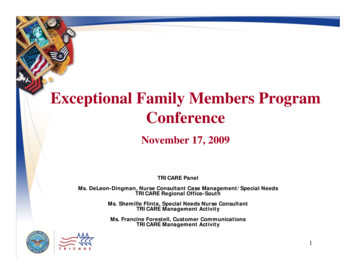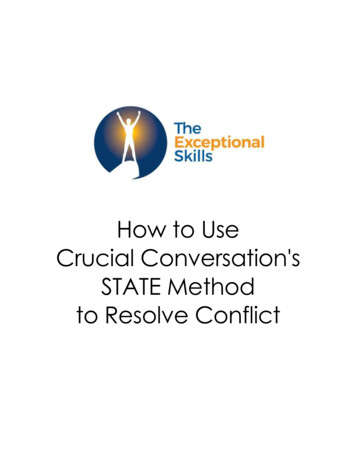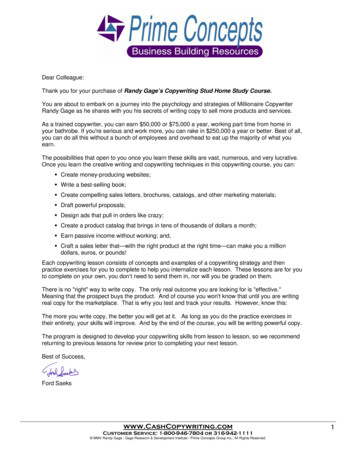
Transcription
DBA HandbooksHow to Become anExceptional DBABrad M McGeheeSecond Edition
How to Become anExceptional DBA2 nd Editionby Brad M McGeheeFirst published 2008 by Simple-Talk PublishingCambridge, UK
Copyright Brad M McGehee 2009ISBN 978-1-906434-22-9The right of Brad M McGehee to be identified as the author of this work has been asserted byhim in accordance with the Copyright, Designs and Patents Act 1988.All rights reserved. No part of this publication may be reproduced, stored or introduced into aretrieval system, or transmitted, in any form, or by any means (electronic, mechanical,photocopying, recording or otherwise) without the prior written consent of the publisher. Anyperson who does any unauthorized act in relation to this publication may be liable to criminalprosecution and civil claims for damages.This book should not, by way of trade or otherwise, be lent, sold, hired out, or otherwisecirculated without the publisher's prior consent in any form other than that in which it ispublished and without a similar condition including this condition being imposed on thesubsequent publisher.Editor - Tony Davis
ContentsIntroduction.7What this Book Covers . 10Your Feedback. 10Chapter 1: Why Should I Become an Exceptional DBA? .13What is an Exceptional DBA? . 13An Exceptional DBA is in the Top 10% of Their Profession . 15Why Bother? . 16Chapter 2: Characteristics of the Exceptional DBA.19Embraces Change. 23Enjoys Learning . 23Accepts Responsibility. 24Maintains Professionalism . 24Trustworthy . 25Dependable. 26Hard-Working. 26Can Work Well Independently or in a Team. 27Manages Time Well. 27Can Communicate Effectively, Both Orally and Verbally . 29Listens Well. 30Realistic. 31Flexible. 32Patient. 33iii
Persistent . 33Enthusiastic . 33Self-Confident . 34Thinks Before Acting . 34Mature . 35Summary: Assess your Strengths and Weaknesses . 35Chapter 3: Specialize (You can't do it all) .37What exactly is a DBA? . 37An A-to-Z List of Typical DBA Tasks. 38Choosing a Specialty. 47Summary: Specialize but be Adaptable. 49Chapter 4: Hone Your Skill Set.51Where Does Formal Education Fit In?. 51Mastering DBA Technical Skills . 57How to Obtain DBA Technical Skills . 59Self-Study Booking Learning. 61Mastering DBA Soft Skills. 61Summary: Starting Honing Your Skills Today (and don't stop) . 66Chapter 5: Is Professional Certification Necessary? .67SQL Server Certification. 68Benefits of Certification . 73Should I Get Certified as a DBA? . 75Summary: There is Little Downside to Certification . 78iv
Chapter 6: Participate in the SQL Server Community .81Benefits of Sharing Your SQL Server Knowledge . 81How Can I Contribute to the SQL Server Community?. 85Summary: Participate in the SQL Server Community Today . 96Chapter 7: Manage Your Career, Don't Let It Manage You .97Define a Career Path . 97Create a Plan and Set Goals . 101Establish New Goals on a Yearly Basis. 103Take Action to Attain Your Goals. 103Revaluate Goals and Long-Term Career Plans as Needed . 104Summary: It Takes a Conscious Decision on Your Part . 105Chapter 8: Manage Your Brand Within Your Organization .107Developing Your Brand. 108Summary: You Can't Be All Things to All People .118Chapter 9: Manage Your Online Brand.121What does it mean to "Manage" your Online Brand? . 121Step 1: Discovering your Online Brand . 123Step 2: Managing your Online Brand. 124Step 3: Expanding your Online Brand . 125DBAs and Social Networking Websites. 128Projecting a Professional Image on the Internet: Dos and Don'ts . 130Summary: Start Managing your Online Brand Today. 132Chapter 10: Get An Exceptional DBA Job .133v
The Job Search . 138Applying for the Job. 144How to Make a Good First Impression in Your New Job . 152Summary: Getting an Exceptional DBA Job is Hard, but theRewards are High . 153Chapter 11: The Exceptional DBA's Code of Conduct .155What is a Code of Conduct?. 155How Can a Code of Conduct be Useful to DBAs? . 156How Should a Code of Conduct be Implemented and Enforced?. 157The Exceptional DBA's Code of Conduct. 158Summary: Exceptional DBAs are defined by their Actions. 163Chapter 12: Best Practices for Becoming an ExceptionalDBA .165Best Practices . 165Summary: The GOYA Principle. 171vi
IntroductionINTRODUCTIONI have worked with database applications for most of my career, and havebeen a SQL Server DBA for the last thirteen years. I started with thecomputer industry in 1981, the year the first IBM Personal Computer,running DOS 1.0, was released. In fact, I owned one of the first models offthe production line.My first exposure to a database application was in 1982. It was called TIM(Total Information Management) and was written by some guys in Lenexa,KS, in ROM BASIC, the version of BASIC that was built into the first IBMPCs. TIM was slow, hard to use, and very buggy, but it whetted my tastefor databases. In 1984, the same developers built a product suite calledSmartware, which included a more-sophisticated database application. Thisis when I first learned how to design databases and develop databaseapplications.It wasn't until 1996 that I began to get serious about being a full-time DBA.At the time, I was working as a Microsoft Certified Trainer, teachingvirtually every certification class Microsoft offered at the time, includingnetworking, development, Exchange, and SQL Server. I soon realized that Icould not keep up with that much technology and that I needed tospecialize. I considered many options, finally narrowing it down tobecoming a DBA, specializing in Microsoft SQL Server. One of thedeciding factors was my positive past experience working with databases.I quit my job as a trainer and set out to become a DBA. While I had someexperience with databases, and a good technical knowledge of SQL Server(from teaching it), I had never worked with databases on a full-time basis.Lacking this "real" experience, I knew I was taking a risk, but you have tostart somewhere.I got my first full-time DBA job with a company that had many full-timeDBAs on staff. Unfortunately, none of the other DBAs wanted to sharetheir knowledge with me. I was the new kid on the block and they wantedto see me sink or swim on my own. While I was familiar with the technicalaspects of using databases such as SQL Server, my lack of day-to-daypractical DBA experience was making life tough. It was hard to admit atthe time, but I really didn't know what DBAs did day in and day out. I wentthrough a painful year, learning most everything the hard way, makingvii
Introductionmany mistakes and learning from them. On the other hand, I was starting toget discouraged working for this company.Then opportunity knocked. While casually browsing the Internet one dayduring lunch, I found a SQL Server DBA job offered at another company.On a whim, I e-mailed my resume, and within a few hours, a recruitercalled me, wanting to know if I could attend a job interview the followingMonday. Things were happening a little fast all of a sudden.I went to the job interview and was hired on the spot. I was a little surprisedat how fast I was hired, and it was a big boost to my confidence. I startedthe new job within two weeks. Then I got a new surprise. This DBAposition was a brand new position and I had to handle all of the DBA workmyself. There was nobody to ask for help or for guidance. I was on myown. I guess I should have asked more questions during the interview. I hadlearned a lot from my previous experience, but my confidence in my skillswas still low.So there I was, in a new job, and the company was dependent on me to betheir first, full-time SQL Server DBA. I have to admit, it was a littleunsettling. However, I guess the situation motivated me to very quickly riseto the occasion. I immediately immersed myself in every piece ofinformation I could find on how to be a great DBA. I read books, I searchedthe Internet, I attended conferences, spoke with other DBAs, and I workedvery hard. Very quickly, my self-confidence in my skills went up. My skillswere noticed and appreciated by my manager. Once I got on this path oftrying to excel in my job, I found I couldn't stop. The company had put a lotof faith in me, and I didn't want to disappoint them.As I progressed, I wrote down almost everything I learned so that Iwouldn't forget it. Eventually, I had a huge document on my hands, and itwas starting to become hard for me to find information when I needed torefer back to it later. To remedy this problem, I decided to convert thedocument to HTML and use a desktop search engine to find the informationI needed. Soon after starting this project, I realized that, for about the sameamount of work, I could create a simple website and share the information Ihad collected with others. I figured that if I could use this information, thenperhaps others might also. And was I ever surprised. Once I launched thewebsite, SQL-Server-Performance.com, it immediately became popular. Idid not realize that there were that were so many DBAs seeking the samekind of information I was seeking. With the positive reception of theviii
Introductionwebsite, I was motivated to continue to add new content, which forced meto continue to learn even more so that I could share what I learned.As the website became established, I began to get e-mails from peoplewanting to learn how to become a DBA. The same types of questions alsoappeared in the forums of the website. At the time, I answered thesequestions the best I could. I even wrote an article called "The Self-TaughtDBA", which received a lot of attention. However, I never addressed thequestion of how someone becomes a great DBA.Eventually, I began speaking at SQL Server conferences and startedmeeting lots of DBAs, novices and experts alike. I observed that mostDBAs fell into one of three groups. One group of DBAs fell into their jobby some career accident and it was just a job to them. Another group ofDBAs were at the novice or intermediate level and really wanted to becomeexpert DB
from 195. Write SQL fast and accurately with code completion Understand code more easily with script layout Continue to use your current editor – SQL Prompt works within SSMS, Query Analyzer, and Visual Studio Keyword formatting, join completion, code snippets, and many more powerful features.











